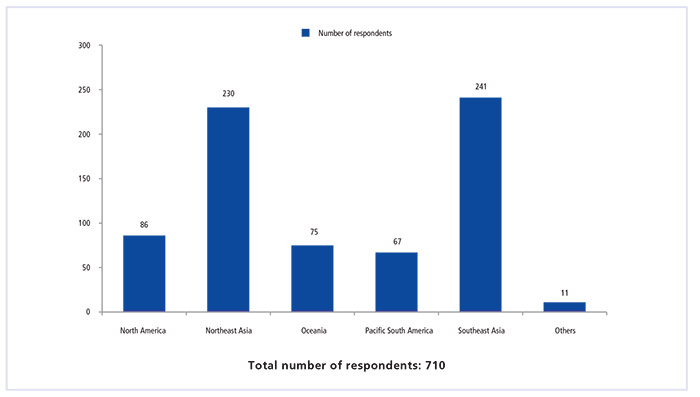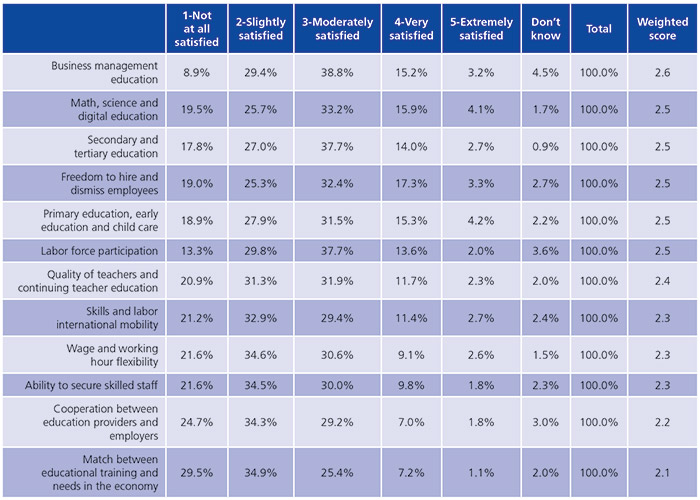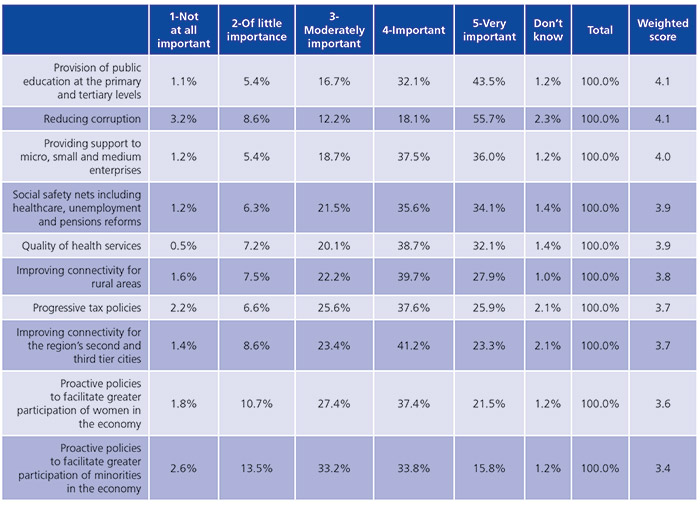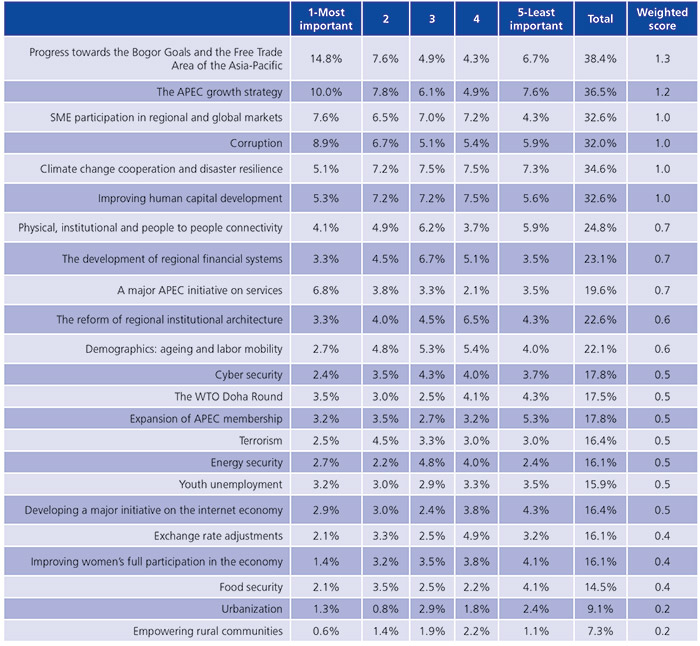ANNEX B - For Chapter 2: Views on promoting inclusive growth and structural reform
This annex presents the findings of a survey of 710 opinionleaders from the Asia-Pacific policy community conducted by the Pacific Economic Cooperation Council from 21 September to 16 October 2015. The survey is disseminated through PECC member committees who are asked to identify panelists based on their knowledge of the Asia-Pacific region. As this is a multistakeholder survey, the Council’s member committees are asked to identify stakeholders – from business, government and the nongovernment sectors.
This is not a survey of public opinion but rather, a survey of those whose views influence policymaking, especially at the regional level. As some of the questions tend to be technical, they require a relatively deep knowledge of developments at regional level. This is by no means a reflection of the general views of a population within any sub-region or even economy. However, we do believe that those surveyed include those who are responsible for influencing and often making decisions on various aspects of their economy’s positions within different regional groups.
The guidance given to PECC member committees for each sector is as follows:
GOVERNMENT
Panelists should be either decision-makers or senior advisors to decision-makers. As a guide, the government respondents in previous years included a number of former and current Ministers, Deputy and Vice-Ministers, Central Bank Governors and their advisors for Asia- Pacific issues, current APEC Senior Officials, and a number of former APEC Senior Officials.
BUSINESS
Panelists should be from companies who have operations in a number of Asia-Pacific economies or conduct business with a number of partners from the region. This might include each economy’s current ABAC members as well as past ABAC members. In last year’s survey, these included CEOs, vice presidents for Asia- Pacific operations, and directors of chambers of commerce.
NON-GOVERNMENT: RESEARCH COMMUNITY/ CIVIL SOCIETY/ MEDIA
Panelists should be well versed in Asia-Pacific affairs, being the type of people governments, businesses, and the media would tap into to provide input on issues related to Asia-Pacific cooperation. These included presidents of institutes concerned with Asia-Pacific issues, heads of departments, senior professors, and correspondents covering international affairs.
In addition to our member committees, we would like to express our appreciation to the National Center for APEC who also circulated the survey to their members, as well as many others who helped in the effort.
RESPONDENT BREAKDOWN
We do not disaggregate results for each economy but rather by sub-regions – Northeast Asia, North America, Oceania, Pacific South America, and Southeast Asia.
- North America: Canada, Mexico, and the United States
- Northeast Asia: China, Hong Kong (China), Japan, Korea, Mongolia, Russia, and Chinese Taipei
- Oceania: Australia, New Zealand, and Papua New Guinea
- Pacific South America: Chile, Colombia, Ecuador and Peru
- Southeast Asia: Brunei Darussalam, India, Indonesia, Malaysia, Philippines, Singapore, Thailand, and Vietnam
BREAKDOWN OF RESPONDENTS BY SECTOR

BREAKDOWN OF RESPONDENTS BY SUB-REGION

1. What are your expectations for economic growth over the next 12 months compared to the last year for the following economies/regions?

2. Please select the top five risks to growth for your economy over the next 2-3 years.

3. Now turning to the recent volatility in financial markets, please indicate your level of agreement with the following statements.

4. How important do you think the structural reform agenda is to growth for the following economies?

5. How important do you think the following areas of structural reform are for the future growth of your economy?

6. More specifically on labor and education issues, how satisfied are you with the following in your economy?

7. More specifically on infrastructure, how satisfied are you with the following in your economy?

8. What do you think are the most important for promoting inclusive growth?

9. Please rate each of the following in terms of their importance to realizing the potential of the internet to drive economic growth for your economy.

10. Please indicate your agreement or disagreement with the following statements:

11.How do you assess the political environment for freer trade in the coming five years?
Please select the box that best fits your assessment.

12. Please rate each of the following from 1 to 5 on the impact they have on attitudes towards freer trade in your economy.
With 1 having no impact, 2 a minor impact, 4 a serious impact and 5 a very serious impact. Please select ‘Don’t know’ if you are unaware or not sure of your answer.

13. What do you think should be the top 5 priorities for APEC Leaders to address at their upcoming meeting in Manila?
Please select ONLY five (5) issues, using a scale of 1-5, please write 1 for the issue you think is most important, 2 for the next most important issue and so on.

<< Previous
Next >>















